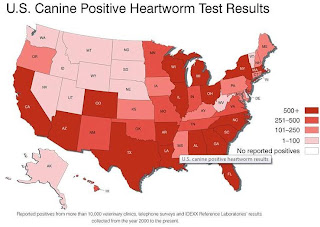1) Feline heartworm disease is not really a heart disease in cats. More often it is a lung disease - so much so that it has been given its own name: Feline Heartworm Associated Respiratory Disease (HARD). The worms cause damage in the lungs, resulting in lifelong breathing issues that often mimic other diseases such as pneumonia, feline asthma, or chronic vomiting. In some cases, a cat will have no signs of disease at all for the lifespan of the heartworm (about 2-3 years) and then, when the heartworms die inside the body, the cat will experience an anaphylactic reaction to the dead parasite (think of it like a bee sting reaction all over the inside of the body!) which will cause sudden death.
2) Testing for heartworm disease in cats is much more complex than in dogs. The test that is commonly used in dogs checks for the presence of a female worm in the body. Since dogs generally have 12-25 heartworms (or up to 300!) when they are infected, this test is very accurate. Because cats only have 1-2 worms when they are infected, the test is only about 50% accurate. Often, when a dog is infected, a single drop of blood will reveal hundreds of microscopic baby heartworms (microfilaria) - another good test. Heartworms do not reproduce in cats (mostly because there is usually only one worm) and so there will never be baby heartworms in the bloodstream. Generally, to confirm heartworm disease in a cat, 2-3 blood tests, an x-ray and possibly an ultrasound are needed to be certain. Because of this, at this time, it is not our recommendation to test cats annually before starting your monthly heartworm prevention treatments.
3) There is currently no recommended treatment for feline heartworm disease. In some cases, surgical removal of the worms is an option.
For more information about heartworm disease, visit the American Heartworm Society or KNOW Heartworms.

According to the CDC's Pets and Parasites risk maps, over 40% of the cases of canine heartworm disease seen in Michigan occur in Oakland and Wayne counties. Overall, Texas accounts for 20% of all US cases of canine heartworm disease, but county-by-county, the risk for dogs is remarkably similar to the risk for dogs in the Detroit area and surrounding suburbs, with risk running as high as 1 in 36 dogs being infected. Feline heartworm statistics are poorly reported, but generally tends to be about 10% of the numbers we see in dogs.
This year promises to be a very buggy year, due to the extremely mild winter we had. According to this report from Toledo, and the first ever heartworm forecast, the water sources are already teeming with mosquito larvae in record numbers, weeks ahead of schedule.If you have not considered using heartworm preventive medication in the past, we encourage you to make this the year to change your mind!






Very informative post! I just ordered heartgard for cats to make sure my cats were treated. I live in an area where there is a higher amount of cases for the disease.
ReplyDeleteSome insects are very dangerous enemies for dogs. If you want to protect your dogs from those insects. You can mix flea and tick pill for dogs in the dog food. As a result your dog will not suffer from the attracts of the insects.
ReplyDelete